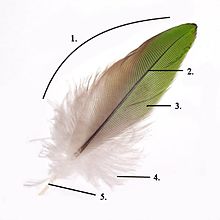vane
English
[edit]


Etymology
[edit]From Middle English vane, Southern Middle English variant of fane, from Old English fana (“cloth, banner, flag”), from Proto-West Germanic *fanō, from Proto-Germanic *fanô, from Proto-Indo-European *peh₂n- (“something woven; weave; tissue; fabric; cloth”).
Cognate with Saterland Frisian Foone (“flag, banner”), Dutch vaan (“banner, flag”), German Low German Fahn (“flag”), German Fahne. Doublet of obsolete fane (“weathercock; banner”) and fanon.
Pronunciation
[edit]- (UK, US) IPA(key): /veɪn/
Audio (Southern England): (file)
- Rhymes: -eɪn
- Homophones: vain, vein
Noun
[edit]vane (plural vanes)
- A weather vane.
- Any of several usually relatively thin, rigid, flat, or sometimes curved surfaces radially mounted along an axis, as a blade in a turbine or a sail on a windmill, that is turned by or used to turn a fluid.
- (ornithology) The flattened, web-like part of a feather, consisting of a series of barbs on either side of the shaft.
- (navigation) A sight on a sextant or compass.
- (weaponry) One of the metal guidance or stabilizing fins attached to the tail of a bomb or other missile.
- Synonym: fin
Derived terms
[edit]Translations
[edit]
|
Further reading
[edit] weather vane on Wikipedia.Wikipedia
weather vane on Wikipedia.Wikipedia
Anagrams
[edit]Czech
[edit]Pronunciation
[edit]Etymology 1
[edit]Noun
[edit]vane m
Etymology 2
[edit]Verb
[edit]vane
Danish
[edit]Etymology
[edit]Pronunciation
[edit]Noun
[edit]vane c (singular definite vanen, plural indefinite vaner)
Inflection
[edit]Esperanto
[edit]Etymology
[edit]Pronunciation
[edit]Adverb
[edit]vane
- in vain, vainly
- Ŝi provis flirti kun li, sed estis vane.
- She tried to flirt with him, but it was in vain.
Related terms
[edit]Italian
[edit]Pronunciation
[edit]Adjective
[edit]vane f pl
Anagrams
[edit]Latin
[edit]Pronunciation
[edit]- (Classical Latin) IPA(key): /ˈu̯aː.ne/, [ˈu̯äːnɛ]
- (modern Italianate Ecclesiastical) IPA(key): /ˈva.ne/, [ˈväːne]
Adjective
[edit]vāne
Adverb
[edit]vānē (comparative vānius, superlative vānissimē)
- in vain, vainly
- "dum bona vane laudata Pharisaei perierint, et peccata publicani accusata evanueritnt." Regula coenobialis
- While the good things of the vainly praised Pharisee will perish, also will the sins of the accused tax collector fade away.
- "dum bona vane laudata Pharisaei perierint, et peccata publicani accusata evanueritnt." Regula coenobialis
References
[edit]- “vane”, in Charlton T. Lewis and Charles Short (1879) A Latin Dictionary, Oxford: Clarendon Press
- vane in Gaffiot, Félix (1934) Dictionnaire illustré latin-français, Hachette.
Middle English
[edit]Noun
[edit]vane
- Alternative form of fane (“flag, vane”)
Norwegian Bokmål
[edit]Etymology
[edit]Noun
[edit]vane m (definite singular vanen, indefinite plural vaner, definite plural vanene)
Derived terms
[edit]References
[edit]- “vane” in The Bokmål Dictionary.
Norwegian Nynorsk
[edit]Etymology
[edit]Pronunciation
[edit]Noun
[edit]vane m (definite singular vanen, indefinite plural vanar, definite plural vanane)
- a habit, custom
- 1957, Tarjei Vesaas, Fuglane:
- Hege hadde for lang tid sidan slutta og bedi han halde seg ifrå denna trøyttande vanen.
- Hege had long ago stopped asking him to refrain from this tiresome habit.
Derived terms
[edit]References
[edit]- “vane” in The Nynorsk Dictionary.
Pali
[edit]Alternative forms
[edit]Noun
[edit]vane
Verb
[edit]vane
- English terms inherited from Middle English
- English terms derived from Middle English
- English terms inherited from Old English
- English terms derived from Old English
- English terms inherited from Proto-West Germanic
- English terms derived from Proto-West Germanic
- English terms inherited from Proto-Germanic
- English terms derived from Proto-Germanic
- English terms derived from Proto-Indo-European
- English doublets
- English 1-syllable words
- English terms with IPA pronunciation
- English terms with audio pronunciation
- Rhymes:English/eɪn
- Rhymes:English/eɪn/1 syllable
- English terms with homophones
- English lemmas
- English nouns
- English countable nouns
- en:Ornithology
- en:Navigation
- en:Weapons
- en:Wind
- Czech terms with IPA pronunciation
- Czech non-lemma forms
- Czech noun forms
- Czech verb forms
- Danish terms inherited from Old Norse
- Danish terms derived from Old Norse
- Danish terms with IPA pronunciation
- Danish lemmas
- Danish nouns
- Danish common-gender nouns
- Esperanto terms suffixed with -e
- Esperanto terms with IPA pronunciation
- Esperanto terms with audio pronunciation
- Rhymes:Esperanto/ane
- Esperanto lemmas
- Esperanto adverbs
- Esperanto terms with usage examples
- Italian 2-syllable words
- Italian terms with IPA pronunciation
- Rhymes:Italian/ane
- Rhymes:Italian/ane/2 syllables
- Italian non-lemma forms
- Italian adjective forms
- Latin 2-syllable words
- Latin terms with IPA pronunciation
- Latin non-lemma forms
- Latin adjective forms
- Latin lemmas
- Latin adverbs
- Middle English lemmas
- Middle English nouns
- Norwegian Bokmål terms derived from Old Norse
- Norwegian Bokmål lemmas
- Norwegian Bokmål nouns
- Norwegian Bokmål masculine nouns
- Norwegian Nynorsk terms derived from Old Norse
- Norwegian terms with IPA pronunciation
- Norwegian Nynorsk lemmas
- Norwegian Nynorsk nouns
- Norwegian Nynorsk masculine nouns
- Norwegian Nynorsk terms with quotations
- Pali non-lemma forms
- Pali noun forms
- Pali noun forms in Latin script
- Pali verb forms
- Pali verb forms in Latin script